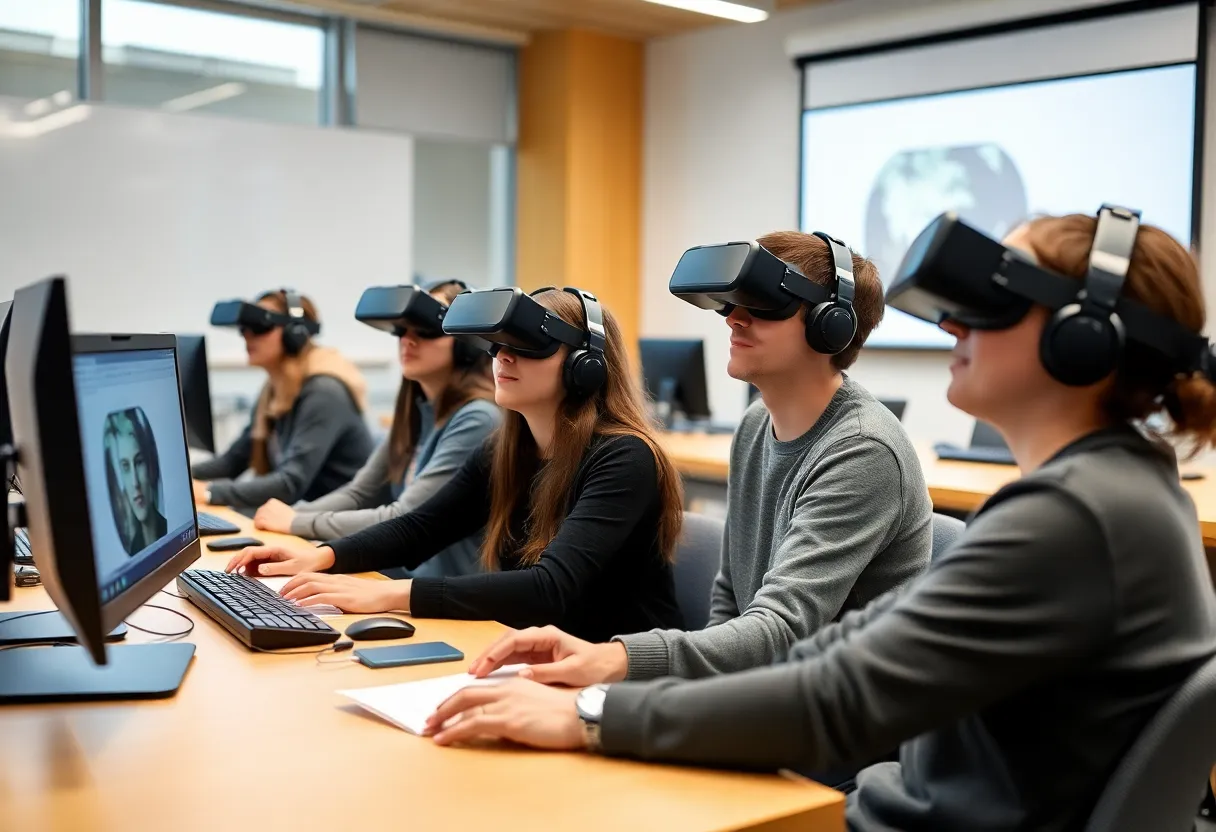Omaha, October 11, 2025
The Omaha Virtual Reality Pipeline program has expanded through partnerships with local tech firms, aiming to create career pathways in immersive technologies. Hosted by the University of Nebraska Omaha, the initiative offers hands-on training in VR development, targeting high-demand areas such as gaming, healthcare, and training simulations. With a goal to train 500 participants by 2027, this program connects educational opportunities with industry needs, benefiting participants through practical skill development and internship placements.
Omaha, NE
Omaha, Nebraska – The Omaha Virtual Reality Pipeline program expanded on October 11, 2025, through new partnerships with local technology firms. This initiative, hosted by the University of Nebraska Omaha (UNO), focuses on creating career pathways in immersive technologies by providing hands-on training in VR development for students and professionals.
Program Expansion and Partnerships
The expansion builds on the program’s foundation by collaborating with regional tech companies. These partnerships aim to connect educational opportunities directly with industry needs, ensuring participants gain practical skills applicable to real-world applications. The program’s core offering includes training sessions that cover the fundamentals of virtual reality creation, from design to implementation.
Hands-on workshops allow learners to work on projects simulating professional environments. This approach helps bridge the gap between classroom learning and workplace demands. Initial groups of participants have already benefited, with several securing internships at partnering firms. These early successes demonstrate the pipeline’s effectiveness in preparing individuals for the job market.
Career Pathways in Immersive Tech
The Omaha Virtual Reality Pipeline targets high-demand areas within immersive technologies, including gaming, healthcare, and training simulations. In gaming, VR skills enable the development of interactive experiences that enhance user engagement. Healthcare applications involve creating simulations for medical training and patient therapy, improving outcomes through innovative tools.
Training simulations extend to various sectors, such as manufacturing and education, where VR can replicate scenarios for skill-building without real-world risks. By focusing on these fields, the program addresses a growing need for skilled workers. Industry analysis indicates that jobs in VR and related technologies are expanding rapidly, driven by advancements in hardware and software.
Training Goals and Participant Impact
UNO officials have set a target to train 500 participants by 2027. This ambitious goal reflects the program’s commitment to scaling its impact across the region. Current cohorts include both university students and working professionals seeking to upskill. The training curriculum is designed to be flexible, accommodating different schedules and experience levels.
Participants engage in collaborative projects that mimic industry workflows, fostering teamwork and problem-solving abilities. Early feedback from the initial groups shows improved confidence in VR tools and a clearer understanding of career options. As the program grows, it plans to incorporate emerging trends, such as augmented reality integration, to keep pace with technological evolution.
Addressing Industry Demand
The expansion comes at a time when demand for VR development experts is surging. Businesses in the Midwest, particularly in tech hubs like Omaha, are investing in immersive solutions to stay competitive. The program’s structure ensures that trainees receive certifications recognized by employers, enhancing employability.
By 2027, the initiative expects to contribute significantly to the local workforce, filling roles in design, programming, and project management within VR. This effort not only supports individual career growth but also bolsters the regional economy through innovation in key sectors.
Background and Future Outlook
The Omaha Virtual Reality Pipeline originated as a response to the increasing integration of VR in everyday industries. Hosted at UNO, it leverages the university’s resources in computer science and engineering. The partnerships announced on October 11 represent a milestone, expanding access to training beyond campus boundaries.
Looking ahead, the program will continue to evolve, potentially including advanced modules on AI-driven VR. This adaptability positions it to meet future challenges in the field. For those interested in enrolling, opportunities remain open for upcoming sessions, emphasizing the program’s role in democratizing access to high-tech careers.
In summary, the expansion of the Omaha Virtual Reality Pipeline underscores a proactive approach to workforce development in immersive technologies. With tangible outcomes already visible through internships and skill-building, it serves as a model for educational-industry collaboration in Nebraska.
FAQ
What is the Omaha Virtual Reality Pipeline program?
The Omaha Virtual Reality Pipeline program expanded on October 11, 2025, through new partnerships with local technology firms. This initiative, hosted by the University of Nebraska Omaha (UNO), focuses on creating career pathways in immersive technologies by providing hands-on training in VR development for students and professionals.
What does the training in the program cover?
The program’s core offering includes training sessions that cover the fundamentals of virtual reality creation, from design to implementation. Hands-on workshops allow learners to work on projects simulating professional environments.
Which industries does the program target?
The Omaha Virtual Reality Pipeline targets high-demand areas within immersive technologies, including gaming, healthcare, and training simulations.
What are the training goals of the program?
UNO officials have set a target to train 500 participants by 2027.
Have there been any early successes from the program?
Initial groups of participants have already benefited, with several securing internships at partnering firms.
Key Features of the Omaha Virtual Reality Pipeline
| Feature | Description |
|---|---|
| Expansion Date | October 11, 2025 |
| Host Institution | University of Nebraska Omaha (UNO) |
| Focus Area | Career pathways in immersive technologies |
| Training Type | Hands-on VR development for students and professionals |
| Target Sectors | Gaming, healthcare, training simulations |
| Training Goal | 500 participants by 2027 |
| Early Outcomes | Internships secured by initial cohorts |
Deeper Dive: News & Info About This Topic
HERE Resources
University of Nebraska Omaha Campaign Raises Over $1.4 Million for Student Support
University of Nebraska Omaha Launches VR Training Program
Omaha Senior Golf Classic Canceled Due to Heavy Rains


